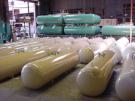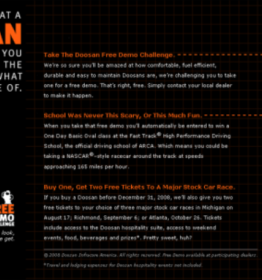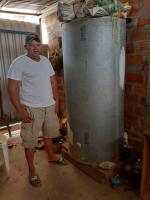Regulators accuse BP of propane pricing scheme
 (Chicago Tribune) Government regulators on Wednesday accused traders at energy giant BP PLC of trying to corner the market for propane during the winter of 2004, in a scheme that temporarily drove prices higher for millions of rural Americans who use the gas to heat their homes. In a lawsuit filed in Chicago federal court, the Commodity Futures Trading Commission said the traders–“with the knowledge, advice and consent of senior management”–bought up enough contracts to give BP a dominant position in the American propane market. They then used that power to illegally manipulate prices.
(Chicago Tribune) Government regulators on Wednesday accused traders at energy giant BP PLC of trying to corner the market for propane during the winter of 2004, in a scheme that temporarily drove prices higher for millions of rural Americans who use the gas to heat their homes. In a lawsuit filed in Chicago federal court, the Commodity Futures Trading Commission said the traders–“with the knowledge, advice and consent of senior management”–bought up enough contracts to give BP a dominant position in the American propane market. They then used that power to illegally manipulate prices.
Mystech: NPR this morning had a lovely portion of the audio recordings of the phone calls documenting the price manipulations (in which BP seized and then cut off 90{a31f233dcfb9a68fbfb0fafc3ce96f3dbf18fa49e3f406b8ddf4c360aa321eb6} of the propane supply)… nothing says “going to jail” like BP officials laughing gleefully over the phone about the scheme. 🙂
The CFTC filed its suit in Chicago, presumably because London-based BP’s U.S. subsidiary is headquartered in suburban Warrenville.BP’s alleged scheme did not go unnoticed. The suit quotes electronic messages between rival traders complaining that BP’s traders were “trying to squeeze” the market. And on a recorded phone call one trader explicitly compared BP’s market moves to the Hunt Brothers of Texas, who sent shock waves through metals markets nearly thirty years ago when they sought to corner the silver market through a “short squeeze” play.The CFTC oversees exchanges on which traders make markets in often volatile commodities such as corn and precious metals, as well as in investment vehicles such as government securities. The manipulation of such markets eventually hurts American consumers, the commission emphasized Wednesday.
“Cornering a commodity market is more than a threat to market integrity,” said Gregory Mocek, head of the CFTC’s enforcement group. “It is an illegal activity that could have repercussions for commercial market participants as well as retail consumers around this country.”
But BP spokesman Ronnie Chappell said “market manipulation didn’t occur,” and he vowed that the company will contest the charges in court.
Nonetheless, Chappell said that an internal investigation conducted by the company found that several employees had failed “to adhere to BP policies governing trading activities” and had been dismissed.
BP, he said, has also “taken steps to strengthen the supervision of our trading activities.”
In a related development, the U.S. Justice Department disclosed Wednesday that a former BP propane trader has pleaded guilty to conspiring to manipulate and corner the propane market in 2004.
The 34-year-old Houston resident, Dennis Abbott, “has agreed to cooperate with law enforcement officials,” the Justice Department said.
According to the department, Abbott said he had understood that senior executives at BP had approved the alleged scheme.
“The purpose of the conspiracy was to enrich BP by inflating the price of propane in February 2004 and . . . to enrich the [traders] through bonuses and other remuneration from BP,” the Justice Department claimed.
According to a trade group, propane is a $30 billion industry in the U.S., with home, agricultural, petrochemical and other users consuming about 20 million gallons of the product, which is also known as liquefied petroleum gas or LP-gas.
Propane is a byproduct of natural gas processing and petroleum refining, and the principal U.S. pipeline carries propane from Texas to Ohio, Illinois, New York and Pennsylvania. Contracts for the product carried by that pipeline trade on the New York Mercantile Exchange.
The CFTC’s suit says that BP’s traders first conducted a “trial run” of their alleged scheme in the winter of 2003, and that they then launched their plan for real in February 2004.
BP routinely tape-records its traders’ telephone conversations, and the lawsuit is spiced with snippets of conversation that the government offers as proof of their alleged market grab. Some market participants “recognized BP’s trading behavior,” the CFTC alleges.
In one conversation, a rival trader asks a BP trader: “Jeez what is y’all’s appetite for propane? I mean, it’s just like feeding an elephant.”
The BP trader answered “Um, yeah, we just like it.”
“You dig it, huh?”
The BP trader answers, “I’d call . . . I’d call it insatiable right now.”
In another conversation, an outside trader says to a BP trader: “Someone told me that you guys were trying to corner the [Texas pipeline] market,” and then explicitly compares the move to the Hunt Brothers.
More than 25 years ago the CFTC shut down an attempt to corner the silver market by the wealthy Hunt brothers of Texas. The Hunts’ ultimately unsuccessful effort sent silver prices to record highs, and distorted metals markets worldwide.
The CFTC suit alleges that although the BP traders’ actions drove propane prices higher for a time, the company ultimately did not rack up the profits the alleged schemers had been hoping for.
Acquiring the dominant position they needed to corner the market ended up costing “more than the profits they extracted” from other dealers, it says.
BP has had difficulties before with its trading activities. In 2003 the British company settled allegations of improper crude-oil trading, without admitting any wrongdoing, by paying a $2.5 million penalty to the New York Mercantile Exchange.
Coming at a time when the oil industry has been on the defensive for generating record-shattering profits while consumers have faced pain at the gas pump, the government’s allegations could generate more criticism of price gouging.
“Now everybody is going to use this one incident as proof positive that the big oil companies are manipulating every market,” said Phil Flynn of Alaron Trading Corp. in Chicago. “It’s going to be guilt by association.”




















